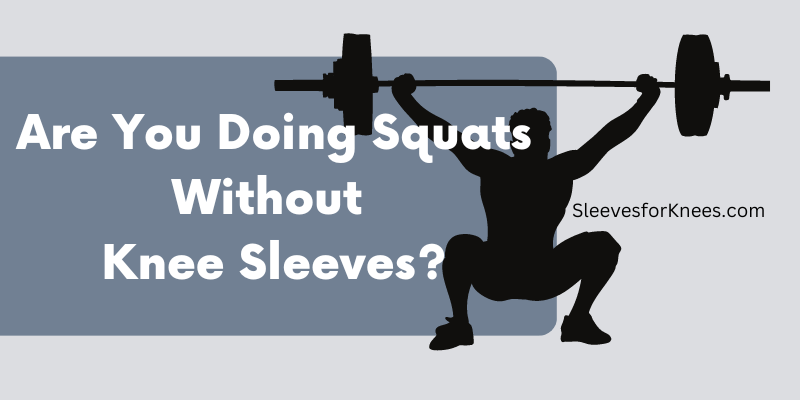Squats are an integral aspect of any serious weightlifting routine. But, what do knee sleeves do for squats? Well, they can provide additional support and protection around the knees, increase perceived knee stability, improve proprioception, and provide warmth and compression to alleviate pain and swelling.
With that in mind, if squatting is part of your regular routine, a quality pair of knee sleeves for weight lifting should definitely be on you radar.
In this post, we will take a closer look at what knee sleeves actually do for squats, as well as some of the factors to consider when deciding whether to use them.
What Do Knee Sleeves Do for Squats?
Improved Blood Flow
Knee sleeves help to improve blood flow to the knee joint during squats. The compression provided by the sleeve helps to increase circulation, which can help to reduce pain and swelling. Improved blood flow can also help to speed up the recovery process after a workout.
Reduced Pain and Swelling
Knee sleeves can help to reduce pain and swelling in the knee joint during squats. The compression provided by the sleeve helps to stabilize the joint, which can help to reduce the risk of injury. Knee sleeves can also help to reduce pain and swelling associated with conditions such as arthritis and tendonitis.
Increased Proprioception
Knee sleeves can help to increase proprioception during squats. Proprioception is the awareness of the position and movement of the body. The compression provided by the sleeve helps to provide feedback to the brain about the position of the knee joint, which can help to improve balance and stability during squats.
How Do Knee Sleeves Benefit Squats When Lifting Weights?
Knee sleeves are a common accessory for weightlifters and athletes who perform squats, and they are definitely not cheating. They are designed to provide support and protection to the knee joint during exercise. Here are some reasons why knee sleeves are beneficial for squats:
Joint Support
Knee sleeves are made of neoprene or similar materials that provide compression and support to the knee joint. This compression helps to stabilize the knee and reduce the risk of injury during squats. Knee sleeves also help to distribute the load evenly across the knee joint, which can reduce the stress on the joint and prevent pain and discomfort.
Warmth
Knee sleeves also provide warmth to the knee joint, which can help to increase blood flow and reduce stiffness. This increased blood flow can help to improve performance during squats and reduce the risk of injury. Knee sleeves are especially beneficial for athletes who train in cold weather or who have a history of knee injuries.
Compression
Knee sleeves provide compression to the knee joint, which can help to reduce swelling and inflammation. This compression can also help to improve proprioception, or the body’s ability to sense its position in space. This improved proprioception can help athletes to maintain proper form during squats and reduce the risk of injury.
Choosing the Right Knee Sleeves for Squats
When it comes to choosing knee sleeves for squats, there are a few factors to consider. Two of the most important are fit and sizing, and thickness and material.
Fit and Sizing
The fit of a knee sleeve is crucial to its effectiveness. A good knee sleeve should be snug without being too tight or restrictive. It should also be comfortable enough to wear for extended periods of time.
To ensure a proper fit, it’s important to measure the circumference of the knee at its widest point. This measurement should then be compared to the sizing chart provided by the manufacturer of the knee sleeve in question.
Thickness and Material
Sleeves in general are made of a variety of materials, but the ones you’re lookoing for are made of neoprene, a synthetic rubber that is known for its elasticity, durability, and ability to retain heat.
Knee sleeves for weightlifting are typically made of neoprene because it is a durable, flexible, and resistant material that can provide several benefits when doing squats.
- Neoprene is water-resistant and can provide a much snugger fit that can do a better job of stabilizing your knee joint during weightlifting movements.
- It is known for its ability to better retain heat, which can help to increase blood flow and reduce muscle stiffness and soreness.
The thickness and material of a knee sleeve can also impact its effectiveness. Thicker knee sleeves generally provide more support and compression, while thinner knee sleeves allow for greater range of motion.
It’s also worth noting that some knee sleeves come with additional features, such as reinforced stitching or silicone strips to prevent slippage. These features can be beneficial if you’re engaging in high-intensity workouts or have specific needs when it comes to knee support.
Conclusion
In conclusion, knee sleeves are good for squats. The sleeves provide support and compression to the knee joint, which can help reduce pain and discomfort during the exercise. They also help keep the knee joint warm, which may lead to improved performance and reduced risk of injury.
While knee sleeves are not a substitute for proper form and technique, they can be a helpful addition to a squatting routine. It is important to choose the right size and type of knee sleeve based on individual needs and preferences.
Overall, knee sleeves are a simple and effective tool that can help improve squatting performance and reduce the risk of knee injury. By providing support and compression to the knee joint, they can help you push themselves to new levels of strength and fitness.
